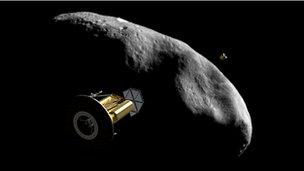New venture 'to mine asteroids'
- Published

Advocates hope asteroid mining could turn into a trillion-dollar business; others are sceptical
A new venture is joining the effort to extract mineral resources on asteroids.
The announcement of plans by Deep Space Industries to exploit the rare metals present in the space rocks turns asteroid mining into a two-horse race.
The other venture, Planetary Resources, went public with its proposals last year.
Advocates of asteroid mining hope it could turn into a trillion-dollar business, but some scientists are highly sceptical of the idea.
Deep Space Industries wants to send a fleet of asteroid-prospecting spacecraft out into the Solar System to hunt for resources.
These spacecraft, which the company has dubbed "Fireflies", would use low-cost CubeSat components and benefit from discounted delivery to space by ride-sharing on the launch of larger communications satellites.
The Fireflies would have a mass of about 55 lb (25 kg) and be launched for the first time in 2015 on journeys of two to six months.
The company then wants to launch bigger spacecraft - which it calls "Dragonflies" - for round-trip visits that bring back samples.
These expeditions would take two to four years, depending on the target, and would return 60 to 150 lbs of material from target asteroids.

Planetary Resources was the first firm to announce asteroid mining proposals
"Using resources harvested in space is the only way to afford permanent space development," said the company's chief executive David Gump.
"More than 900 new asteroids that pass near Earth are discovered every year. They can be like the Iron Range of Minnesota was for the Detroit car industry last century - a key resource located near where it was needed. In this case, metals and fuel from asteroids can expand the in-space industries of this century."
Asteroids could yield precious minerals such as gold, platinum and rare-Earth metals. But some are also thought to harbour water ice, which could be used as a raw material for the manufacture of rocket propellant or even breathable air.
The other firm in the mining race, Planetary Resources, has backing from several billionaire investors, including Google's Larry Page and Eric Schmidt, software executive Charles Simonyi and filmmaker James Cameron.
That company wants to start by launching orbiting telescopes that would identify suitable asteroid targets for mineral exploitation.
However, some scientists struggle to see how cost-effective asteroid mining could be, even with the high value of gold and platinum.
They point out that an upcoming Nasa mission to return just 60g (two ounces) of material from an asteroid will cost about $1bn.
- Published24 April 2012